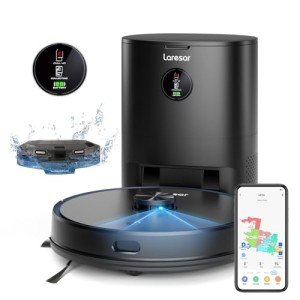20 Resources That Will Make You Better At Robotic Vacuum
The Rise of the Robotic Vacuum Cleaner: Revolutionizing Home Cleaning
In the world of household home appliances, robotic vacuum cleaners have emerged as one of the most considerable developments recently. These autonomous devices provide benefit and effectiveness, permitting property owners to maintain cleaner home without the drudgery of manual vacuuming. Highly recommended Online site out the evolution, functionality, benefits, and factors to consider relating to robotic vacuum cleaners, in addition to offering insights through information tables and frequently asked concerns.
A Brief History of Robotic Vacuum Cleaners
The journey of robotic vacuum started in the late 20th century, with early prototypes stopping working to make substantial strides in homes. However, advancements in innovation caused the intro of more refined models in the early 2000s. Business such as iRobot and Neato played a critical function in promoting these wise home devices.
Evolution Timeline of Robotic Vacuum Cleaners
Year
Turning point
1996
Introduce of the first robotic vacuum, the ELECTROLUX TRINITY
2002
iRobot introduces the Roomba, a widely recognized design
2012
Introduction of designs with sophisticated mapping capabilities
2020
Incorporation of expert system for enhanced navigation
2023
Designs with integrated wise home connection and app control
How Robotic Vacuum Cleaners Work
Robotic vacuum make use of a combination of sensing units, mapping innovation, and expert system to navigate and clean different surface areas successfully. Here's a streamlined overview of their core functionality:
Sensors: Equipped with infrared or ultrasonic sensing units, these devices can find obstacles, cliffs, and dirt, allowing them to browse through rooms without crashing into furnishings or tumbling down stairs.
Navigation: Most modern robotic vacuum cleaners integrate wise mapping technologies, allowing them to draw up the home layout and optimize cleaning courses.
Cleaning Mechanism: Using brushes and suction power, robotic vacuums gather dirt, dust, and debris from various floor types, including carpets and hardwood.
Charging and Cleaning Schedules: After completing a cleaning session or when their battery runs low, these robotics immediately return to their charging dock. Users can set cleaning schedules by means of smartphone apps, helping keep a tidy home easily.
Advantages of Robotic Vacuum Cleaners
Robotic vacuum cleaners offer various advantages over conventional vacuuming methods. Here are some of the key benefits:
- Time-Saving: Automated cleaning indicates homeowners can designate their time to other activities.
- Convenience: Scheduling cleaning sessions allows for a tidy home without manual intervention.
- Thorough Cleaning: Many robotic designs come with specialized brushes to tackle animal hair and supply deep cleaning on carpets and carpets.
- Smart Home Integration: Many systems are suitable with smart home systems, providing voice control and remote management.
Popular Features in Robotic Vacuum Cleaners
Function
Description
Mapping Technology
Develops a digital map of the cleaning area
Mobile App Control
Provides users the ability to start/stop or schedule cleaning sessions from another location
Self-Cleaning
Some designs have docking stations that can self-empty dust bins
Advanced Sensors
Finds dirt more effectively and navigates better
Voice Control
Suitable with virtual assistants like Alexa and Google Assistant
Considerations Before Purchasing a Robotic Vacuum Cleaner
While robotic vacuum cleaners provide many benefits, possible purchasers ought to consider a few aspects before making a purchase. Here are some points to bear in mind:
Key Factors to Evaluate
Floor Type: Certain designs perform better on carpets while others excel on tough floors. Buyers should pick versatile vacuums if they have actually blended floor covering.
Battery Life: Longer battery life permits extended cleaning sessions. Search for models that can cover large areas without regular recharging.
Dustbin Capacity: A larger dustbin decreases the frequency of emptying, making cleaning less labor-intensive.
Sound Level: Some designs operate silently, which is best for homes with infants or delicate pets.
Maintenance: Users need to also evaluate the ease of upkeep, specifically for filters and brushes.
Possible Drawbacks
- Price: Robotic vacuum cleaners can be substantially more costly than standard vacuums.
- Effectiveness: While they efficiently keep tidiness, they might not always match the deep cleaning efficacy of manual vacuums.
- Barrier Navigation: Some models may deal with certain kinds of furnishings or chaotic locations, potentially leading to missed out on spots.
Frequently Asked Questions About Robotic Vacuum Cleaners
Q1: How frequently should I run my robotic vacuum cleaner?
A1: It generally depends upon your family. For homes with family pets or high foot traffic, running it everyday is advantageous. In less active homes, you may discover every other day is sufficient.
Q2: Can robotic vacuum work on carpets?
A2: Most robotic vacuums can clean carpets; nevertheless, functions such as suction power and brush design can significantly impact their effectiveness on various carpet types.
Q3: Are robotic vacuum cleaners great for family pet hair?
A3: Yes, lots of designs are particularly developed to get pet hair and come with specialized brushes to avoid tangling.
Q4: What takes place when the vacuum lacks battery?
A4: Most robotic vacuums immediately return to their charging dock when their battery is low, guaranteeing they are all set for the next cleaning session.
Q5: Can I manage my robotic vacuum with my smart device?
A5: Yes, many robotic vacuum cleaners come geared up with mobile apps that enable you to set up cleansings, screen development, and receive notifications.
Robotic vacuum cleaners represent a significant development in home-cleaning innovation, combining convenience with effectiveness to essentially change how homes preserve tidiness. As innovations continue to emerge, these gadgets are ending up being progressively capable, using users not only time-saving options but likewise enhanced cleaning experiences. As the marketplace continues to grow, potential purchasers are encouraged to weigh the functions, benefits, and factors to consider carefully to discover the best model customized to their distinct needs. Whether it's a hectic household, a pet enthusiast, or somebody seeking automation in their cleaning regimen, there's likely a robotic vacuum that fits the expense.
